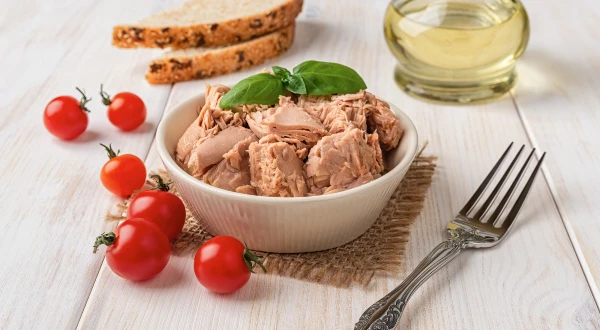Tuna benefits, storage method, season, calories, protein
Tuna Nutrition

| Tuna (100g) Nutrition | |||
| Carbohydrate | Protein | Fat | Calories |
| 0.1g | 28g | 1.3g | 132kcal |
| Main Nutrition | Protein, zinc, vitamin C, potassium | ||
| Main Benefits | Brain development and memory improvement, immunity strengthening, diet | ||
| Side Effects | Pregnant women are advised to consume small amounts as it may affect the health of the fetus. | ||
Tuna is a fish belonging to the mackerel and tuna family. and They are also nicknamed “Chicken of the Sea” and “Noble of the Sea.” Tuna, a fish loved by so many people, has a streamlined, plump body with a bluish-black back and white belly. It can be eaten both raw and cooked, and its flesh is relatively oily compared to other fish.
tuna benefits

1. Brain development
Tuna contains unsaturated fatty acids, which help regenerate brain cells and facilitate smooth connections between brain cells. Additionally, it helps improve brain function and boost memory and brain power. Therefore, regularly consuming tuna helps prevent Alzheimer’s disease.
2. Blood pressure management
Tuna is rich in potassium, which helps lower blood pressure. Potassium dilates blood vessels and is effective in reducing blood pressure. Tuna is also rich in omega-3 fatty acids, which, along with potassium, have anti-inflammatory effects on the cardiovascular system. It also helps lower blood pressure and prevent cardiovascular diseases such as stroke and heart attack.
3. Strengthen immunity
Tuna is rich in manganese, zinc, vitamins C and D, and selenium. Selenium has the effect of suppressing free radicals that interfere with aging of the body or the immune system, and this is called an antioxidant effect. It is effective in preventing aging and boosting immunity.
4. Weight management
Tuna is a high-protein, low-fat, low-calorie food. It is also low in fat and rich in unsaturated fatty acids. Therefore, tuna is a good diet food for people who are trying to manage their weight because it provides good taste while balancing calories. In addition, the omega-3 fatty acids contained in tuna stimulate the hormone leptin, which helps with weight management by preventing overeating.
Storage Method
If you store canned tuna as is, oxidation will occur, so it is recommended to transfer it to an airtight container and refrigerate it. It is best to consume raw tuna as soon as possible and store it frozen in a special airtight container.
Season
The season is winter, from November to February, when fat and various nutrients are rich and harmonious.
Side Effect
- Tuna is an animal that belongs to the top of the food chain. Therefore, since they are more exposed to heavy metals than other animals, people who consume excessive amounts of tuna may also be exposed to heavy metals.
- For pregnant women, it is recommended to consume less than 100g per week as it may affect the intellectual development of the fetus.
🔹StarKist: Learn Health Benefits of Tuna
🔹Dr. Axe: Tuna Fish: Protein Powerhouse or Danger Food?
🔹Bumble Bee Seafood: Tuna Nutrition | All Your Questions Answered